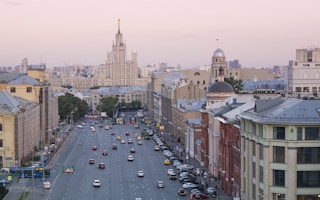Indian Prime Minister Narendra Modi has announced that his country will ratify the Paris climate agreement in October, a significant boost in the campaign to have the agreement become legally binding by the end of the year.
India will join the 61 other countries that have formally signed up to limit future global temperature rise to a maximum of 2°C. But one important player is still missing. Russia, the world’s fifth-largest greenhouse gas emitter is unlikely to ratify by the end of the year.
Following a special climate event at the 2016 United Nations General Assembly, Alexander Bedtritsky, special adviser on climate to Vladimir Putin, confirmed that “Russia will not artificially speed up the ratification process”.
Russian representatives have said they need more time to evaluate the effects of the Paris agreement on the Russian economy, which is heavily dependent on fossil fuels. The government wants to draft a low-carbon development strategy before deciding to ratify.
So far, the plan is to work out an analysis of the socio-economic effects of the ratification by mid-December, and to later draft a strategy for low-carbon development. No certain deadline for ratification, which is due to take place by passing a corresponding legal act within Russia, has been set.
The great climate debate
Why is Russia dragging its feet? One reason is the fact that opinions on the merits of the Paris agreement are split within the country. Most senior officials and federal ministries support the treaty and informally speak in favor of quicker ratification. But opposition comes mainly from large private businesses, predominantly from the coal and steel sectors.

Singapore’s Foreign Minister Vivian Balakrishnan and UN Secretary General Ban Ki-moon at the Paris agreement ratification ceremony. Image: Mike Segar/Reuters
The companies, whose extracting and processing facilities are largely located in Siberia, claim that quick ratification, and the introduction of any kind of carbon price within Russia will cause serious socio-economic damage. This will affect vulnerable groups employed in the coal industry the most, they say.
These companies have secured support among powerful business lobby groups, think-tanks and research institutes. Together, these groups run anti-Paris agreement campaigns, including one on the “right to coal”, in some of Russia’s resource-rich regions. Meanwhile, authors of privately sponsored research papers argue that the Russian economy will suffer severe losses after the agreement enters into force.
Most oil and gas majors, however, are keeping quiet, neither objecting nor openly supporting the new climate treaty. Representatives of the Russian gas giant Gazprom often talk about importance of switching to natural gas to bring down greenhouse gas emissions, but rarely speak openly about the importance of the Paris agreement.
There are a number of pro-climate stakeholders, however. These include officials from federal ministries, think tanks and NGOs, as well as certain businesses, all of whom argue vocally for ratification.
“
Most senior officials and federal ministries support the treaty and informally speak in favor of quicker ratification. But opposition comes mainly from large private businesses, predominantly from the coal and steel sectors.
Shortly before the Paris climate summit in December 2015, a number of Russian companies launched the Russian Partnership for Climate Protection, including high-tech state-owned enterprise Rusnano, state-owned hydro-energy company Rushydro, state-owned banks Sberbank and Vneshtorgbank, private bank Alfabank, and a group of aluminium companies, Rusal.
Oleg Deripaska, the owner of Rusal and one of Russia’s richest oligarchs, has been quoted in the international media calling for a global price on carbon.
According to a recent report, three Russian companies have already embedded a carbon price into their business strategy.

Vladimir Putin and Oleg Deripaska at APEC in 2014. Image: Wang Zhao/Reuters
Bad economic climate
There are other significant barriers to climate progress. The perception prevails that Russia can’t allow itself an ambitious domestic climate policy for economic reasons – namely, the lack of funding for emission reduction and energy efficiency measures.
Speaking at a recent joint China-Russia group meeting on climate change, a high-level official with the Ministry of Economic Development said that the core activities in carbon regulation in Russia should be concentrated around energy efficiency. This requires an annual investment of no less than €6 billion.
Energy efficiency was high on the Russian agenda from 2009-2011. But following the imposition of international sanctions over the conflict in Ukraine, the issue has been dropped. Regional subsidies for emission reduction and energy efficiency measures are being cut to zero for the third year in a row.
Another problem is the lack of access to international financing sources – here, once again, following international sanctions, a number of international donors and development institutions have cut support for emission reduction projects in Russia.
Global posturing
In spite of domestic controversies, Russia continues to speak in favor of the new global climate treaty on the world stage, trying to show its openness to climate efforts.
Some experts, including economist George Safonov, argue that by showing its readiness to fight climate and environmental challenges, Russia is both trying to set itself up as an important global player, and also improve its relations with the West on “neutral ground”.
Russia is also trying to develop climate and environmental cooperation with Brazil, India, China and South Africa, proposing to set up a platform for green technologies.
Will these international efforts be enough if Russia doesn’t step up and ratify with the other big emitters? Experts have said that if the Paris agreement enters into force without Russia’s signature, the country will lose its right to vote and take decisions in new climate working groups.
This would be a shame. However slow Russia’s ratification schedule is, it remains crucial to keep the world’s fifth-largest emitter on board for future climate negotiations. This means continuing to give it a seat at the table.
![]()
Angelina Davydova is senior lecturer, St Petersburg State University. This article was originally published on The Conversation.











